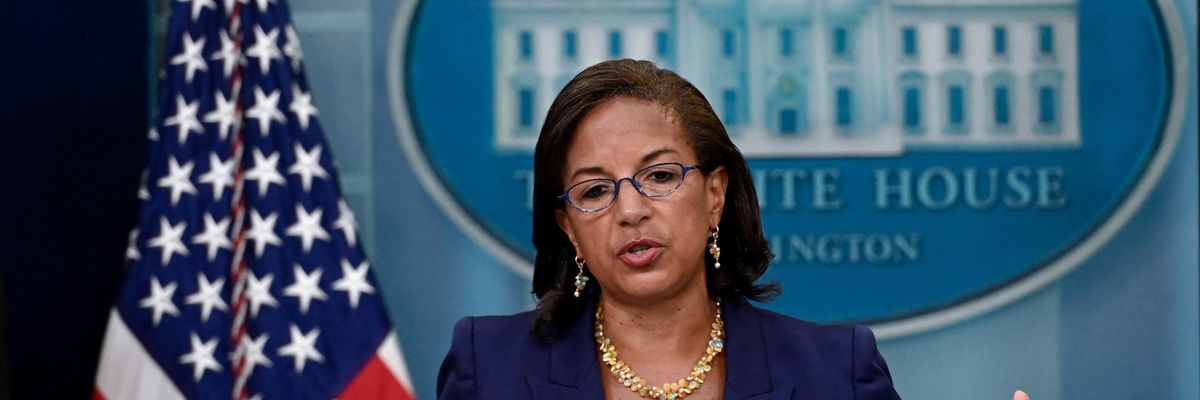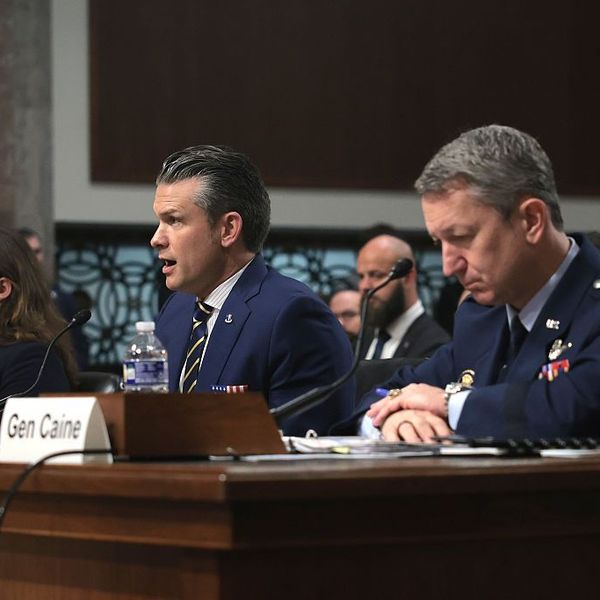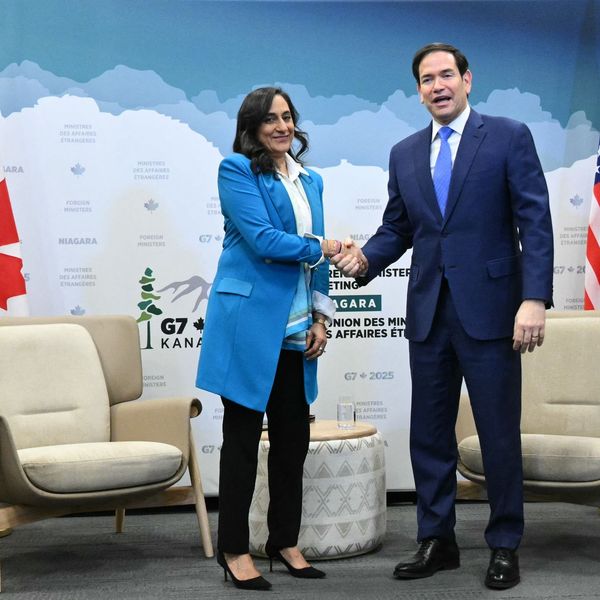
Ambassador Susan Rice, director of the Domestic Policy Council, speaks during the daily press briefing at the White House in Washington, D.C., on August 24, 2022. (Photo: Oliver Douliery/AFP via Getty Images)
Coalition Urges Biden Admin. to Consider Creating US Human Rights Body
"The United States is lagging behind other nations in translating its global human rights obligations into domestic policies," said the director of the ACLU's Human Rights Program.
U.S. President Joe Biden declared during a speech last year that the United States must demonstrate that "our commitment to human rights begins at home."
That's how dozens of human rights experts and groups began a Thursday letter to Ambassador Susan Rice, director of the Domestic Policy Council, which "drives the development and implementation of the president's domestic policy agenda in the White House and across the federal government."
The coalition of 84 organizations and 37 individuals wrote that they "strongly support that sentiment and believe that this principle--that human rights begin at home--should be the basis for a bold approach to ensuring that everyone in the United States enjoys the rights and freedoms guaranteed by international human rights law."
\u201cNew: Broad coalition of 84 civil and human rights groups and academic partners urge the White House to establish a presidential commission to explore the creation of a national human rights body. https://t.co/238KEhzNfZ @ACLU @davidakaye @civilrightsorg\u201d— Jamil Dakwar (@Jamil Dakwar) 1671138139
As the letter details:
The United States has been a historic leader in the global effort to establish universal standards of human rights protection, beginning with the Universal Declaration of Human Rights in 1948. At the same time, while state and local authorities have increasingly looked to human rights standards to improve the lives of people, the federal government has not comprehensively integrated the United States' human rights obligations into domestic law and policy and has resisted efforts to create domestic human rights monitoring, enforcement, and accountability mechanisms. Thus, as we mark the adoption of the Universal Declaration 74 years ago this month, we urge the Biden administration to make good on the president's words by reinvigorating that leadership and starting the process of establishing a national human rights institution ("NHRI").
In particular, we propose that the Biden administration establish a national committee of experts to study the creation of an American NHRI, with robust civil society participation, and make recommendations within a year of its establishment.
"When properly constituted and mandated, national human rights bodies can provide valuable oversight and means of implementing a country's international human rights obligations," said Felice Gaer, director of the Jacob Blaustein Institute for the Advancement of Human Rights at the American Jewish Committee, which signed the letter.
"An American NHRI can offer a meaningful path to encourage U.S. institutions, buoyed by civil society, to adhere to human rights commitments that our government has made and to which we routinely call on other countries to adhere," added Gaer, also a longtime former member of the U.N. Committee Against Torture.
The letter says the coalition stands "ready to support you in your efforts to launch such a process and take the first steps toward bringing human rights home," and directs the Biden administration to reach out to Jamil Dakwar, director of the ACLU's Human Rights Program, and David Kaye, a professor at the University of California, Irvine, School of Law and a former United Nations special rapporteur on freedom of expression.
\u201cthe @POTUS @JoeBiden has said that 'human rights begins at home'. this is an opportunity to transform that idea into a real thing. thanks to @jdakwar @ACLU & many others who signed our letter to the White House's Susan Rice for helping move this agenda forward.\u201d— David Kaye (@David Kaye) 1671145465
"Nearly all of the United States' democratic partners worldwide have national institutions to help them meet their human rights commitments," Kaye noted, echoing the letter. "But the United States stands as an exception; it has adopted treaties but done very little to implement them domestically. It's time to make human rights not just a foreign policy issue, as important as that is, but also a question of America's domestic practice."
Dakwar similarly asserted that "the United States is lagging behind other nations in translating its global human rights obligations into domestic policies, and an independent national human rights institution would help advance this goal."
"But such an institution must do more than monitor and implement U.S. human rights commitments," Dakwar continued. "It can educate and make human rights more visible. It can provide a platform for marginalized communities to uphold their human rights. And it can, in a near-term sense, reinforce the Biden administration's own priorities, especially under its Summit for Democracy and National Strategy on Gender Equity and Equality."
An Urgent Message From Our Co-Founder
Dear Common Dreams reader, The U.S. is on a fast track to authoritarianism like nothing I've ever seen. Meanwhile, corporate news outlets are utterly capitulating to Trump, twisting their coverage to avoid drawing his ire while lining up to stuff cash in his pockets. That's why I believe that Common Dreams is doing the best and most consequential reporting that we've ever done. Our small but mighty team is a progressive reporting powerhouse, covering the news every day that the corporate media never will. Our mission has always been simple: To inform. To inspire. And to ignite change for the common good. Now here's the key piece that I want all our readers to understand: None of this would be possible without your financial support. That's not just some fundraising cliche. It's the absolute and literal truth. We don't accept corporate advertising and never will. We don't have a paywall because we don't think people should be blocked from critical news based on their ability to pay. Everything we do is funded by the donations of readers like you. Will you donate now to help power the nonprofit, independent reporting of Common Dreams? Thank you for being a vital member of our community. Together, we can keep independent journalism alive when it’s needed most. - Craig Brown, Co-founder |
U.S. President Joe Biden declared during a speech last year that the United States must demonstrate that "our commitment to human rights begins at home."
That's how dozens of human rights experts and groups began a Thursday letter to Ambassador Susan Rice, director of the Domestic Policy Council, which "drives the development and implementation of the president's domestic policy agenda in the White House and across the federal government."
The coalition of 84 organizations and 37 individuals wrote that they "strongly support that sentiment and believe that this principle--that human rights begin at home--should be the basis for a bold approach to ensuring that everyone in the United States enjoys the rights and freedoms guaranteed by international human rights law."
\u201cNew: Broad coalition of 84 civil and human rights groups and academic partners urge the White House to establish a presidential commission to explore the creation of a national human rights body. https://t.co/238KEhzNfZ @ACLU @davidakaye @civilrightsorg\u201d— Jamil Dakwar (@Jamil Dakwar) 1671138139
As the letter details:
The United States has been a historic leader in the global effort to establish universal standards of human rights protection, beginning with the Universal Declaration of Human Rights in 1948. At the same time, while state and local authorities have increasingly looked to human rights standards to improve the lives of people, the federal government has not comprehensively integrated the United States' human rights obligations into domestic law and policy and has resisted efforts to create domestic human rights monitoring, enforcement, and accountability mechanisms. Thus, as we mark the adoption of the Universal Declaration 74 years ago this month, we urge the Biden administration to make good on the president's words by reinvigorating that leadership and starting the process of establishing a national human rights institution ("NHRI").
In particular, we propose that the Biden administration establish a national committee of experts to study the creation of an American NHRI, with robust civil society participation, and make recommendations within a year of its establishment.
"When properly constituted and mandated, national human rights bodies can provide valuable oversight and means of implementing a country's international human rights obligations," said Felice Gaer, director of the Jacob Blaustein Institute for the Advancement of Human Rights at the American Jewish Committee, which signed the letter.
"An American NHRI can offer a meaningful path to encourage U.S. institutions, buoyed by civil society, to adhere to human rights commitments that our government has made and to which we routinely call on other countries to adhere," added Gaer, also a longtime former member of the U.N. Committee Against Torture.
The letter says the coalition stands "ready to support you in your efforts to launch such a process and take the first steps toward bringing human rights home," and directs the Biden administration to reach out to Jamil Dakwar, director of the ACLU's Human Rights Program, and David Kaye, a professor at the University of California, Irvine, School of Law and a former United Nations special rapporteur on freedom of expression.
\u201cthe @POTUS @JoeBiden has said that 'human rights begins at home'. this is an opportunity to transform that idea into a real thing. thanks to @jdakwar @ACLU & many others who signed our letter to the White House's Susan Rice for helping move this agenda forward.\u201d— David Kaye (@David Kaye) 1671145465
"Nearly all of the United States' democratic partners worldwide have national institutions to help them meet their human rights commitments," Kaye noted, echoing the letter. "But the United States stands as an exception; it has adopted treaties but done very little to implement them domestically. It's time to make human rights not just a foreign policy issue, as important as that is, but also a question of America's domestic practice."
Dakwar similarly asserted that "the United States is lagging behind other nations in translating its global human rights obligations into domestic policies, and an independent national human rights institution would help advance this goal."
"But such an institution must do more than monitor and implement U.S. human rights commitments," Dakwar continued. "It can educate and make human rights more visible. It can provide a platform for marginalized communities to uphold their human rights. And it can, in a near-term sense, reinforce the Biden administration's own priorities, especially under its Summit for Democracy and National Strategy on Gender Equity and Equality."
U.S. President Joe Biden declared during a speech last year that the United States must demonstrate that "our commitment to human rights begins at home."
That's how dozens of human rights experts and groups began a Thursday letter to Ambassador Susan Rice, director of the Domestic Policy Council, which "drives the development and implementation of the president's domestic policy agenda in the White House and across the federal government."
The coalition of 84 organizations and 37 individuals wrote that they "strongly support that sentiment and believe that this principle--that human rights begin at home--should be the basis for a bold approach to ensuring that everyone in the United States enjoys the rights and freedoms guaranteed by international human rights law."
\u201cNew: Broad coalition of 84 civil and human rights groups and academic partners urge the White House to establish a presidential commission to explore the creation of a national human rights body. https://t.co/238KEhzNfZ @ACLU @davidakaye @civilrightsorg\u201d— Jamil Dakwar (@Jamil Dakwar) 1671138139
As the letter details:
The United States has been a historic leader in the global effort to establish universal standards of human rights protection, beginning with the Universal Declaration of Human Rights in 1948. At the same time, while state and local authorities have increasingly looked to human rights standards to improve the lives of people, the federal government has not comprehensively integrated the United States' human rights obligations into domestic law and policy and has resisted efforts to create domestic human rights monitoring, enforcement, and accountability mechanisms. Thus, as we mark the adoption of the Universal Declaration 74 years ago this month, we urge the Biden administration to make good on the president's words by reinvigorating that leadership and starting the process of establishing a national human rights institution ("NHRI").
In particular, we propose that the Biden administration establish a national committee of experts to study the creation of an American NHRI, with robust civil society participation, and make recommendations within a year of its establishment.
"When properly constituted and mandated, national human rights bodies can provide valuable oversight and means of implementing a country's international human rights obligations," said Felice Gaer, director of the Jacob Blaustein Institute for the Advancement of Human Rights at the American Jewish Committee, which signed the letter.
"An American NHRI can offer a meaningful path to encourage U.S. institutions, buoyed by civil society, to adhere to human rights commitments that our government has made and to which we routinely call on other countries to adhere," added Gaer, also a longtime former member of the U.N. Committee Against Torture.
The letter says the coalition stands "ready to support you in your efforts to launch such a process and take the first steps toward bringing human rights home," and directs the Biden administration to reach out to Jamil Dakwar, director of the ACLU's Human Rights Program, and David Kaye, a professor at the University of California, Irvine, School of Law and a former United Nations special rapporteur on freedom of expression.
\u201cthe @POTUS @JoeBiden has said that 'human rights begins at home'. this is an opportunity to transform that idea into a real thing. thanks to @jdakwar @ACLU & many others who signed our letter to the White House's Susan Rice for helping move this agenda forward.\u201d— David Kaye (@David Kaye) 1671145465
"Nearly all of the United States' democratic partners worldwide have national institutions to help them meet their human rights commitments," Kaye noted, echoing the letter. "But the United States stands as an exception; it has adopted treaties but done very little to implement them domestically. It's time to make human rights not just a foreign policy issue, as important as that is, but also a question of America's domestic practice."
Dakwar similarly asserted that "the United States is lagging behind other nations in translating its global human rights obligations into domestic policies, and an independent national human rights institution would help advance this goal."
"But such an institution must do more than monitor and implement U.S. human rights commitments," Dakwar continued. "It can educate and make human rights more visible. It can provide a platform for marginalized communities to uphold their human rights. And it can, in a near-term sense, reinforce the Biden administration's own priorities, especially under its Summit for Democracy and National Strategy on Gender Equity and Equality."

